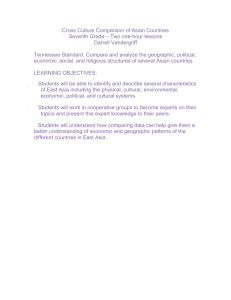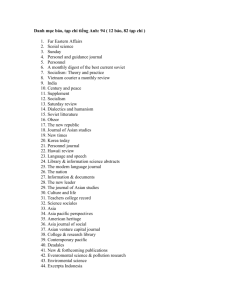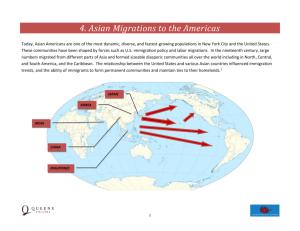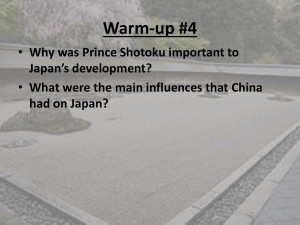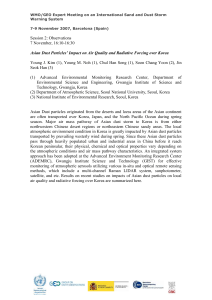CountryManager Simulation Introductory PowerPoint
advertisement
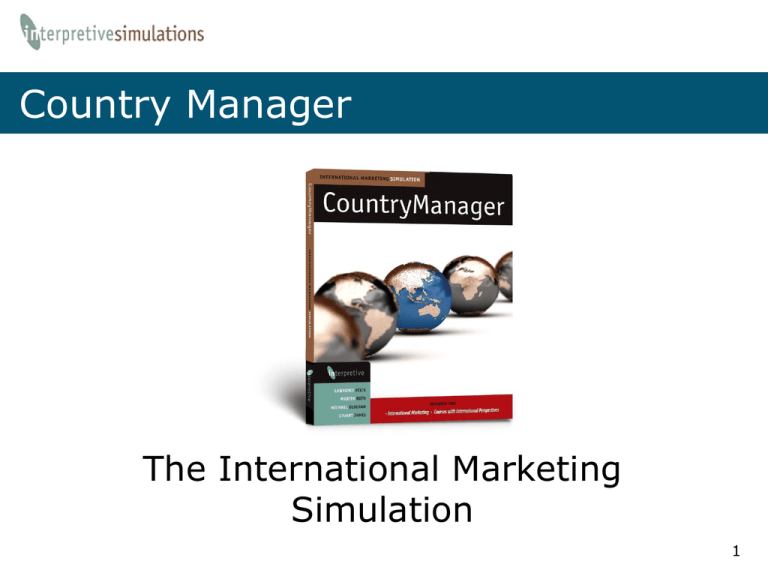
Country Manager The International Marketing Simulation 1 Welcome to Country Manager! CountryManager is an International Marketing simulation focusing on market entry and expansion: • You play the role of Toothpaste Category Manager for a major consumer products company about to enter the Asian market • For the next ten years, your team will build the “Allsmile” brand in one market and, ultimately, expand into other Asian markets Develop and implement strategies that are attractive to customers in each country and profitable for Allstar Brands 2 The Environment Six countries offer viable market potential • China, Japan, India, S. Korea, Philippines, Thailand • Each market has unique environmental, buyer, competitive, and distribution characteristics • The ultimate goal is to develop a REGIONAL presence in Asia, doing so through a sequential market entry approach 3 The Environment Country Population (Millions) GDP (Billions $) Purchasing Power Parity Toothpaste Retail Sales (Millions $) China 1,337.0 9,872 2,940.8 Japan 126.4 4,338 1,566.5 India 1,189.0 4,061 1,023.7 48.8 1,459 363.2 101.8 351 437.5 66.7 588 235.3 S. Korea Philippines Thailand Note: Asia Scenario, 2011 4 Environment - Competition • Starting situation: multiple firms competing in different countries • 4 international competitors: B&B healthcare Caremore Driscol Evers • Plus… regional and local competitors All individuals/teams play in benchmark competition mode and face the same environment 5 Consumers • Defined by lifestyle (younger, families, older) and primary need (economy, whitener, health, kids) • Consumers differ cross-nationally and by segment in terms of: Toothpaste size, delivery system, and texture preferences Needs they are trying to satisfy with regard to formulation (prevention of cavities, whiter teeth, good taste) Price sensitivity Preferred store / distribution outlet • Customers are more likely to purchase a brand that they know, meets their needs, and can find in their preferred store. 6 The Product - Toothpaste • Packaging and formulation variations Sizes: travel, personal, and family Delivery: tube, pump Texture: paste, gel Formulations: basic, whitener, healthy, kids • Your firm has 21 different combinations of these available to introduce as unique SKUs. More may become available in future years. 7 Key Strategic Decisions • What Country / Market(s) to Enter? • Consumer Segment(s) to Target within countries entered • Choice of Distribution Channel(s) within countries entered • Where to Source Production? • Home and/or one Asian country 8 Market Entry Decisions Issues to consider for “Market Entry/Exit”: • Market potential and growth • General economic/political outlook • Competitive intensity • Synergies with other/existing markets • Regional Customization vs. Standardization • Distribution • Cost structures – production/distribution • Shipping and tariffs 9 Plant and Production Decisions Issues to consider for plant location and sourcing options: • Production will take place at Home until an Asian plant is opened • Only one plant may be built in Asia • One year to build capacity (500 mill units/yr) • Any production necessary to meet demand in Asia beyond plant capacity takes place at Home • In Asian countries other than where you build the plant, you choose Home or Asia sourcing • Local production goes to local market first 10 Plant and Production Examples You have entered China, India, and S. Korea • Based on your decisions, demand in China is 40 million units, demand in India is 20 million units, and demand in S. Korea is 30 million units • You choose to source demand in China and India from the plant in China, and S. Korea from the Home plant • Example 1: Your plant is located in China, with 30 million units of productive capacity What Happens? • 30 Million units of demand in China will be sourced from the plant in China • 10 million units of demand in China will be sourced from Home • All demand in India and S. Korea will be also fulfilled from the Home plant 11 Plant and Production Examples You have entered China, India, and S. Korea • Based on your decisions, demand in China is 40 million units, demand in India is 20 million units, and demand in S. Korea is 30 million units • You choose to source demand in China and India from the plant in China, and S. Korea from the Home plant • Example 1: Your plant is located in China, with 50 million units of productive capacity What Happens? • 40 million units of demand in China will be sourced from the plant in China • 10 million units of demand in India will be sourced from the plant in China • The other 10 million units of demand in India and all demand in S. Korea will be fulfilled from the Home plant 12 Which Market to Enter? Your first priority is to determine which of the six countries recommended by the board is the most attractive for Allsmile; The information accessible from the Environment, Consumers, and Competition menus will allow you to compare the markets according to many important factors, including: • political, economic, geographic and social/demographic considerations • issues directly related to manufacturing, distribution, marketing and sales in the countries you are considering • competition Compare market opportunities in the simulation reports, as described further in the student manual and demo. 13 Entering the Market(s) Once you have made the decision to enter new market(s), you will need to decide how to launch your product, including: • • • • Selection of SKUs Price of each SKU in local currency Advertising campaigns Selection of channels and channel support The information accessible from the country detail reports will allow you to: • Decide on target markets within a country • Recognize competitive positioning and strategy Research the options within your selected market by clicking a Country name link to open detail reports, as described further in the student manual and demo. 14 Things to Keep in Mind • Set your regional strategy first • Overall strategic framework drives country-level decisions • Plan for the long-term • Decisions 1-3 = focus on awareness, gaining distribution • Decisions 3-5 = build market share • Decisions 6+ = now aim to be profitable • Recognize regional strategic issues • Trade agreements • Standardization vs. Customization • Don’t forget the basics! • 4Ps – Product, Price, Promotion, Place • Competition 15




